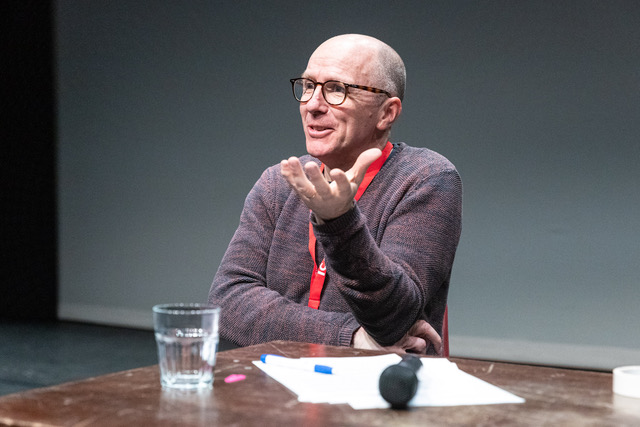Care Aesthetics

Photo Credit: ICAF
By Dijana Milošević, theater director, writer, educator, co-founder of DAH Theatre Research Center, Belgrade, Serbia, IMPACT board member
One of the most exciting moments of ICAF (International Community Arts Festival) for me was James Thompson’s lecture ‘’Care Aesthetics.’’ This year’s edition of the Festival was titled ‘’Sound of Change.’’ I came to the Festival for an IMPACT organizational work meeting, and to follow the Festival’s program along with my colleagues from IMPACT.
James Thompson is a professor of applied theater at University of Manchester and besides many other activities he is a co-founder of an art organization, ‘’In Place of War.’’ His focus has been on art programs in conflict zones all around the world.
The first time I listened to him was many years ago, when holding his performance/lecture he shared with the audience his experience of working and staying in the Democratic Republic of Congo with his organization, ‘’In Place of War,” Back then the work of his organization with a local organization lead to a tragedy, since that local organization was attacked by its compatriots who believed that they were surely given money or some other material goods since they were working with someone from Europe. I remember being touched by the sincerity of James Thompson who carefully described the whole situation and asked some important questions about the responsibility of those (including himself) who come to intervene in a context whose complexity they maybe cannot understand.
During his lecture at ICAF James Thompson started with that event and how his colleague and friend from DRC Antoine Muvunyi who survived the violence, came to Great Britain at his invitation to have an operation and rehabilitation of his blown up elbow. After six months Antoine was able to get back home.
Certainly, the whole operation, logistics of health insurance, accommodation, expenses and so on, all had to be carefully planned out by James Thompson. And that lead him, after many years of staying and working with theater and art in war zones, to come to the concept of care aesthetics, namely to ask himself: ‘’What if the work of a nurse, physio, or homecare worker was designated an art so that the qualities of the experience they create became understood as aesthetic qualities? What if the interaction and physical connection created by artists, directors, dancers, or workshop facilitators was understood as a work of care?”
The whole lecture James created carried exactly that aesthetic quality: from the way in which the lecturer was sincerely interested in that everyone in the audience can see him and hear him well, through the way in which he talked, that implied that in the audience there were also persons whose native tongue isn’t English. We could sense his care in the carefully ‘’sculpted’’ parts of the lecture where he aimed to transfer to us not only his own experiences but also experiences of professionals from both fields – both healthcare and art. In that way he has inspired us to truly question ourselves, working inside of our professions, or creating our art, that has good intentions from the start: are we really caring for that other we are working with or for whom we create our programs, projects, art? Is the quality of human contact really such that we can talk about aesthetic quality?
Quoting different examples, he encouraged us to think about how attentiveness and care can become constituent parts of all our activities. During the lecture he read to us two verses from Roger Robinson’s song ‘’Grace’’ from the collection ‘’A Portable Paradise’’:
Another consultant tells the nurses to stop feeding a baby, who will soon die,
and she commands her loyal nurses to feed him. “No baby must dead
wid a hungry belly.” And she’d sit in the dark, rocking that well-fed baby,
held to her bosom, slowly humming the melody of “Happy” by Pharrell.
And I think, if by some chance, I’m not here and my son’s life should flicker,
then Grace, she should be the one.”
At the end of the lecture, James was carefully, with utmost focus and respect, responding to questions asked. I left with the feeling of hope and inspiration.
Translation from Serbian: Katarina Drenjanin